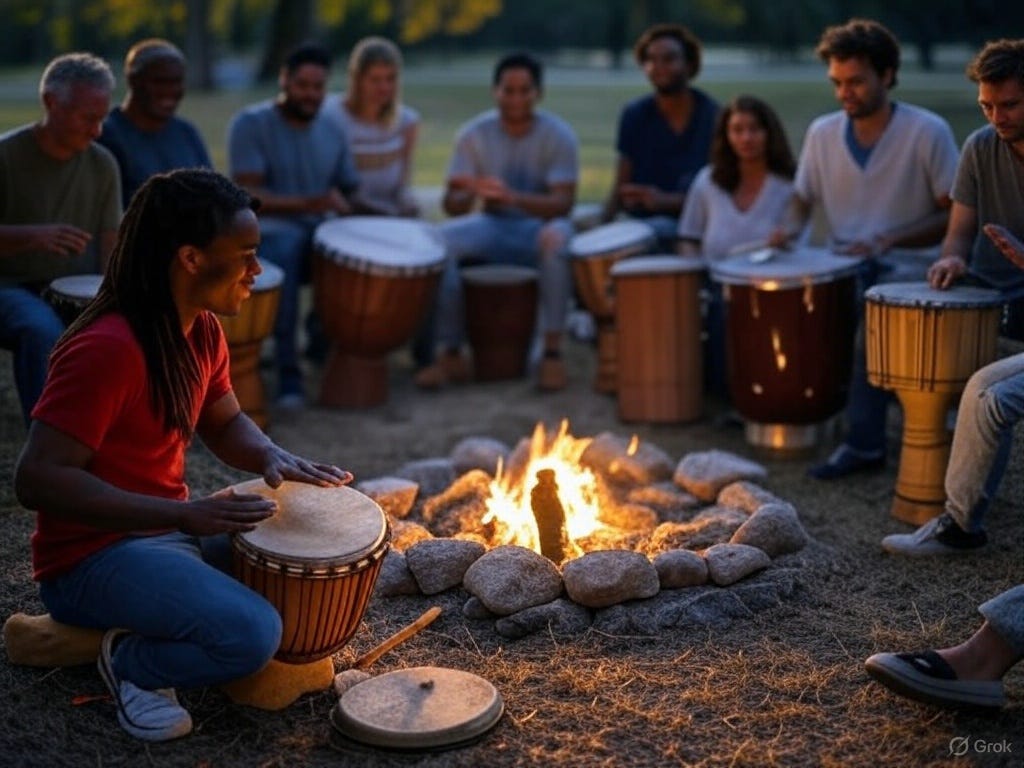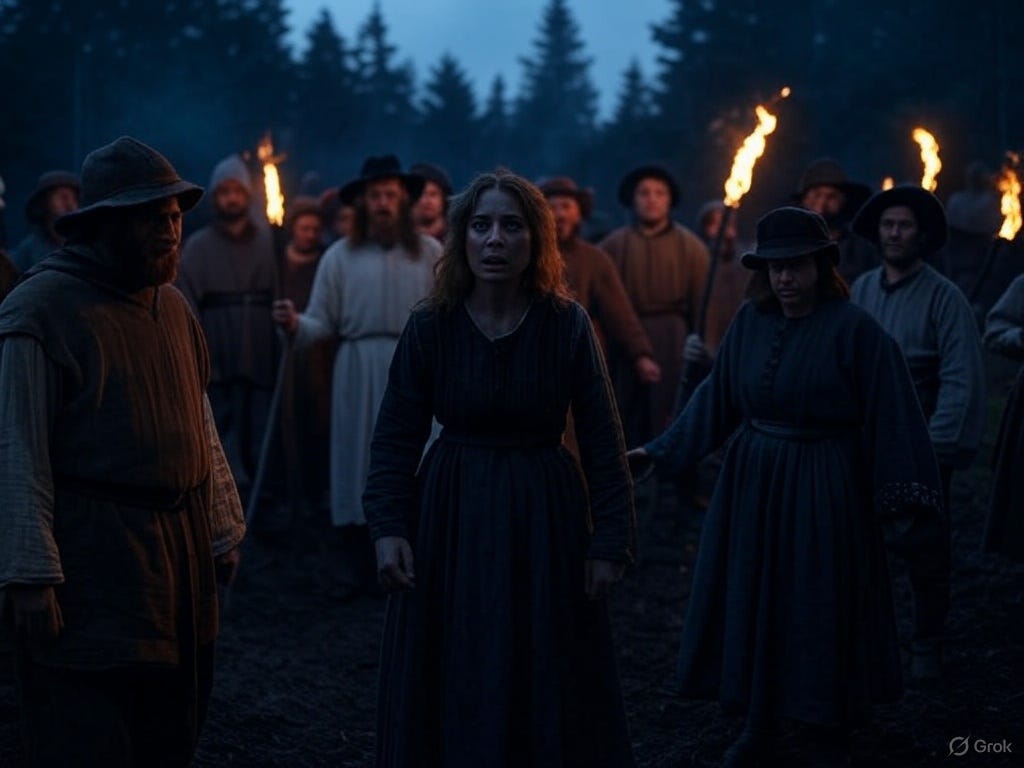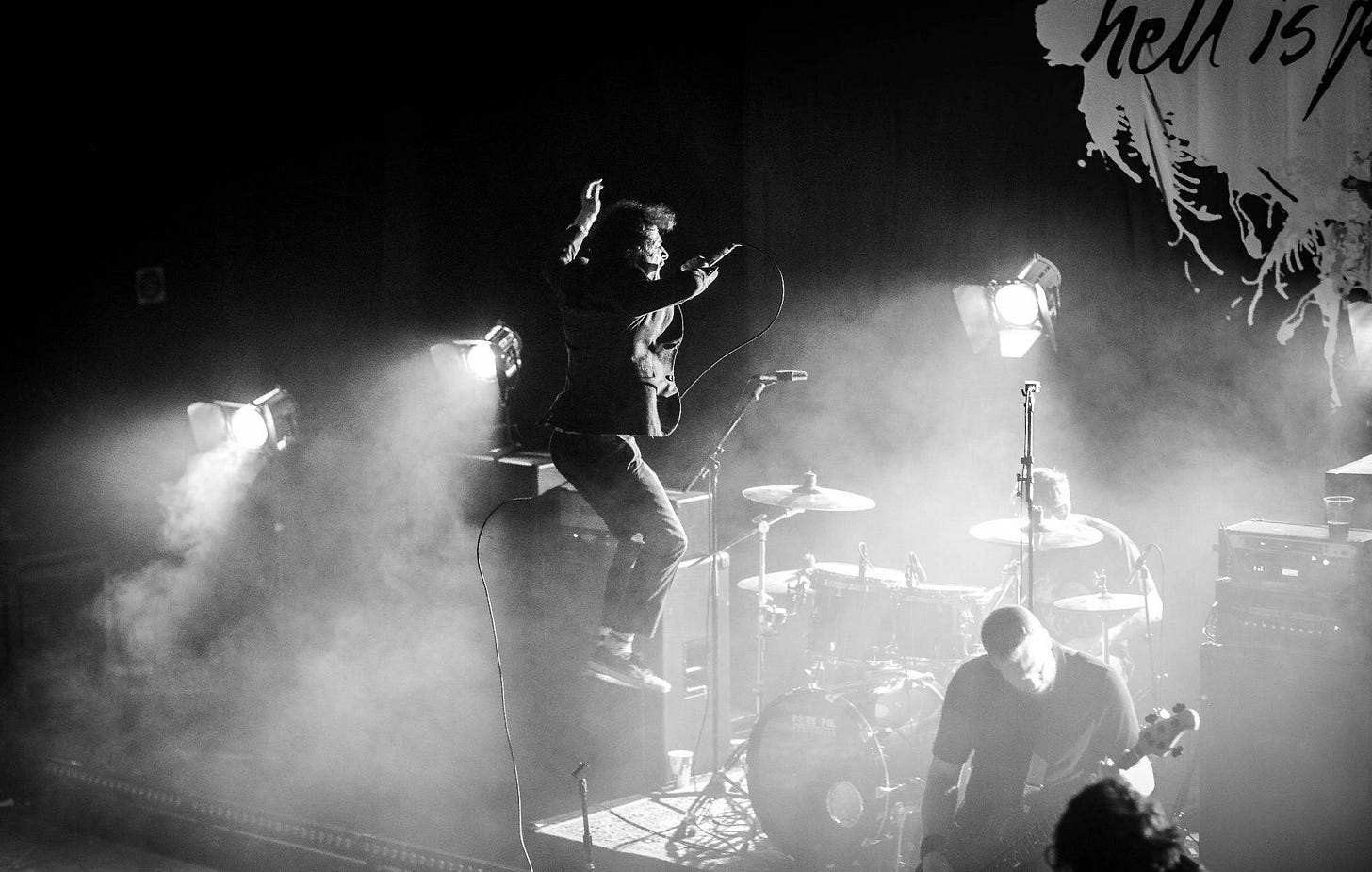The Thrill and Peril of Group Consciousness
Collective chill or mob mentality?
Feeling part of a greater unity is very often a beautiful and valuable thing. Whether we feel this way through God or through a sense of oneness with the natural world, suspending individualistic patterns of thinking – even just for a while – can be a major source of meaning in life.
Group events are among the most common ways of feeling part of a greater unity.
We’ve all, I’m sure, been to concerts, sporting events, or religious ceremonies and had what might be called an ecstatic experience – where ‘ecstatic’ is understood in the original Greek sense of going outside of oneself.
I remember the first time I went to a rock concert at the impressionable age of 14. (The age of entry was 16, but my brother was reporting on the gig for a local newspaper and managed to sneak me and a friend in.)
I never saw that particular band – Hell is For Heroes – perform live again, but the physical sensation made by a wall of guitar amplifiers has never left me. More than that, I recall experiencing the music not entirely as an individual but instead ecstatically as a part of the audience. In the small, packed, and very sweaty venue, I joined a group consciousness, which was created by and responded to the sound unfolding in front of us.
Collective effervescence
Émile Durkheim, one of the fathers of sociology, gave a name to this phenomenon: “collective effervescence.” It’s precisely that sense of losing oneself in a group consciousness united in celebration of something.
As mentioned above, this phenomenon has many advantages, which are partly personal and partly social.
On the personal level, we can feel a kind of psychological relief from the burdens of the individual ego. Going about our daily lives, we tend to focus on tasks at hand, things we’ve done, and things we have yet to contend with. But when we escape ourselves by slotting into collective action and thinking, we suspend our day-to-day concerns. What matters instead is the event taking place here and now.
On the social level, there are advantages too. Uniting in group consciousness allows for the bonding of members of a society who might otherwise live atomised lives. Durkheim observed that religious rituals allowing for collective effervescence were key features of every known society since they serve to create and sustain those very societies. They bring people together around shared spaces and objects, protecting the latter by marking them out as special. This gives the society as a whole a sense of meaning and identity.
In secular societies, like those of northern and western Europe (where I live), religious rituals are less prominent today. They are certainly not absent altogether, but to a large extent, they have been replaced by other means of collective effervescence, which are typically political, sporting, or cultural. Even a punk rock gig in a packed and sweaty bar can have something of this quality (assuming the band is any good!), although the community being created is, of course, much smaller and ephemeral.
Mob rule
There is, however, a potential danger in collective effervescence, one that very possibly occurred to you as you read the above. It’s that a group consciousness can emerge in pursuit of something bad to the extent that people who otherwise might not approve of the act in question find themselves going along with it.
At the most extreme end of the scale, there are witch-hunts, mob violence, and pogroms, which all involve the creation of group consciousness in pursuit of a shared goal. These certainly involve collective effervescence, but the problem, needless to say, is that they are also terrible acts.
At the very mild end of the negative scale, there are events of the kind I participated in two weekends ago. I was taking part in a half-marathon around Bath, one of Britain’s most beautiful cities.
The atmosphere was much closer to a carnival than I’d imagined: 11,000 runners moving as one herd through the streets, like a great mass of plains animals heading to a watering hole. Thousands more people lined the streets shouting and chanting, playing music and banging on makeshift percussion. It was an intoxicating sensation, amplified by the physical exertion of the race. (“I’m having an out-of-body experience!” I heard a fellow runner declare at one point to no one in particular.)
This was all great fun and has a well-documented effect on runners’ performance. However, the downside of the collective effervescence was the littering that spread through the throng like wildfire. Thousands of paper cups and plastic sachets were tossed on the roadsides and into drains, all by people who would ordinarily regard littering as completely unacceptable. In the group mindset, however, it became a reasonable thing to do – never mind the fact that there were enormous bins located after every water station – and so people just unthinkingly joined in.
Anomie
So what’s going on here? Again, I think Durkheim has something of the answer with his concept of anomie.
Durkheim uses ‘anomie’ to describe a state of normlessness. What he has in mind is when former ethical standards have ceased to have any force, leaving only fragmentary or weak guidelines for action. This can happen gradually across a whole society, but it seems to me it can also happen suddenly in cases of collective effervescence.
The result of the potent fusion of anomie and collective consciousness can be bad: very obviously so in the cases of witch-hunts and mob violence, but also the mild case of my littering marathon runners. Each individual’s former aversion to littering was weakened by joining in a group consciousness that deemed it acceptable.
Holding on to the good
Image: Hell is For Heroes, nme.com
So how, then, are we to balance the danger of anomie with the fact that collective effervescence is often a good thing, and to be cherished? I can see two ways.
The first is to step back out of it, either deliberately or just instinctively, when we feel the mood souring. During the half-marathon, I was emotionally pulled out of the collective effervescence when I saw my fellow runners casually tossing rubbish to the ground. It slightly repulsed me, and this feeling immediately brought me back to myself.
The second (and perhaps preferable) way is to engage in events leading to collective effervescence that have ethical guardrails built in. Religious rituals generally have these, but with cultural events – like punk rock gigs and marathons – there is a less established set of norms. Given this, it’s unsurprising that they could quickly descend into anomie.
But what if we designed our ecstatic events around the ideas of respect for other people and the environment? What if our punk rock gigs had an ethos of helping out crowd members at risk of being hurt? And what if our marathons were not just about the sport but also an appreciation of the place they’re located in, which would involve leaving it in as good a condition as it was found?
If we engaged in collective effervesces of those kinds, then we could, it seems to me, continue to derive great meaning and enjoyment from forming part of a group consciousness. Importantly, however, we would also be doing so at the same time as holding on to the good – and this would be a real reason for celebration.







OMG, collective effervescence is EXACTLY what I have experienced at every concert given by The Band. It is almost psychedelic and occurs without the need for any drugs. It is very spiritual. I doubt I would get that from a Trump rally.
May it always be something beautiful and mystical.